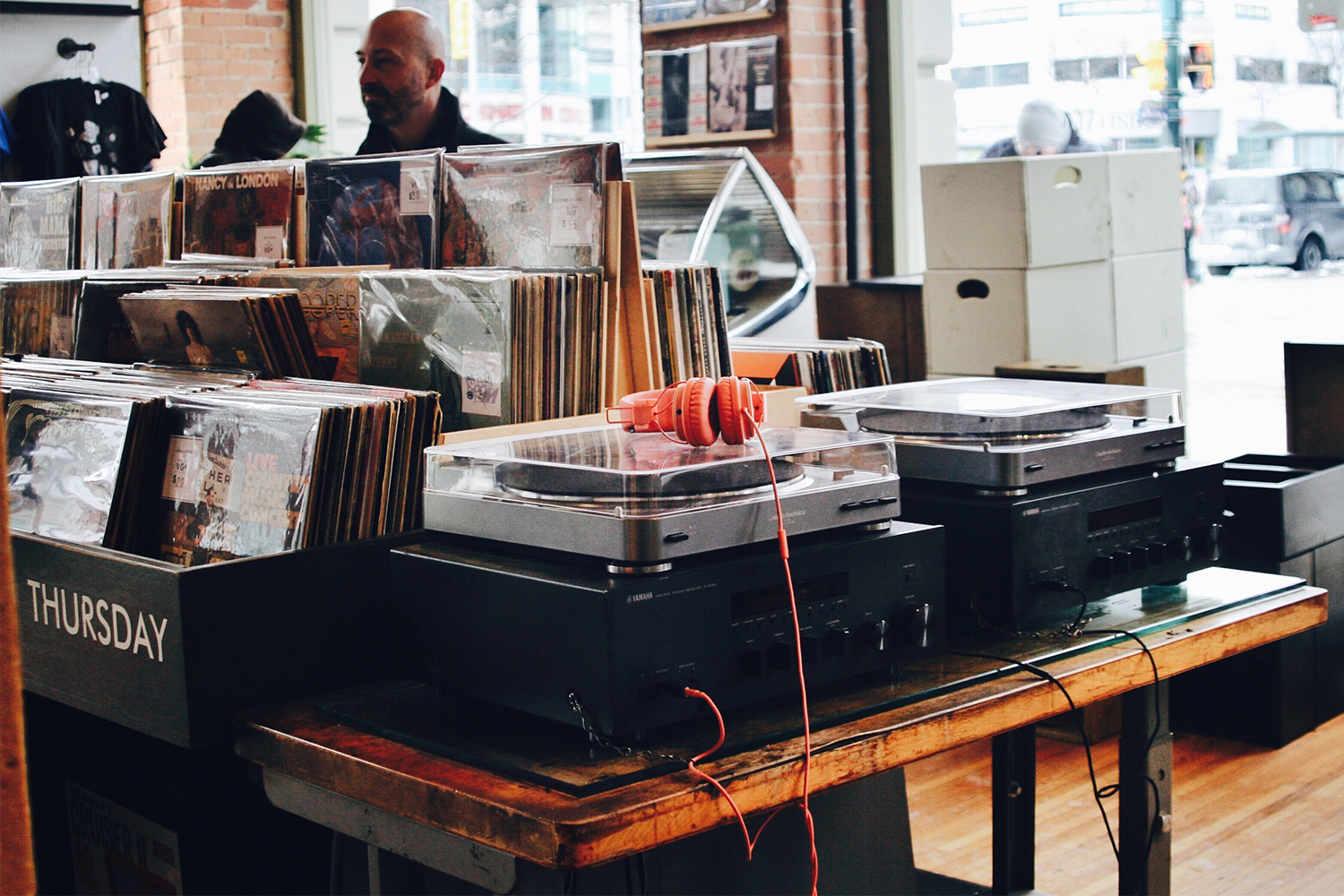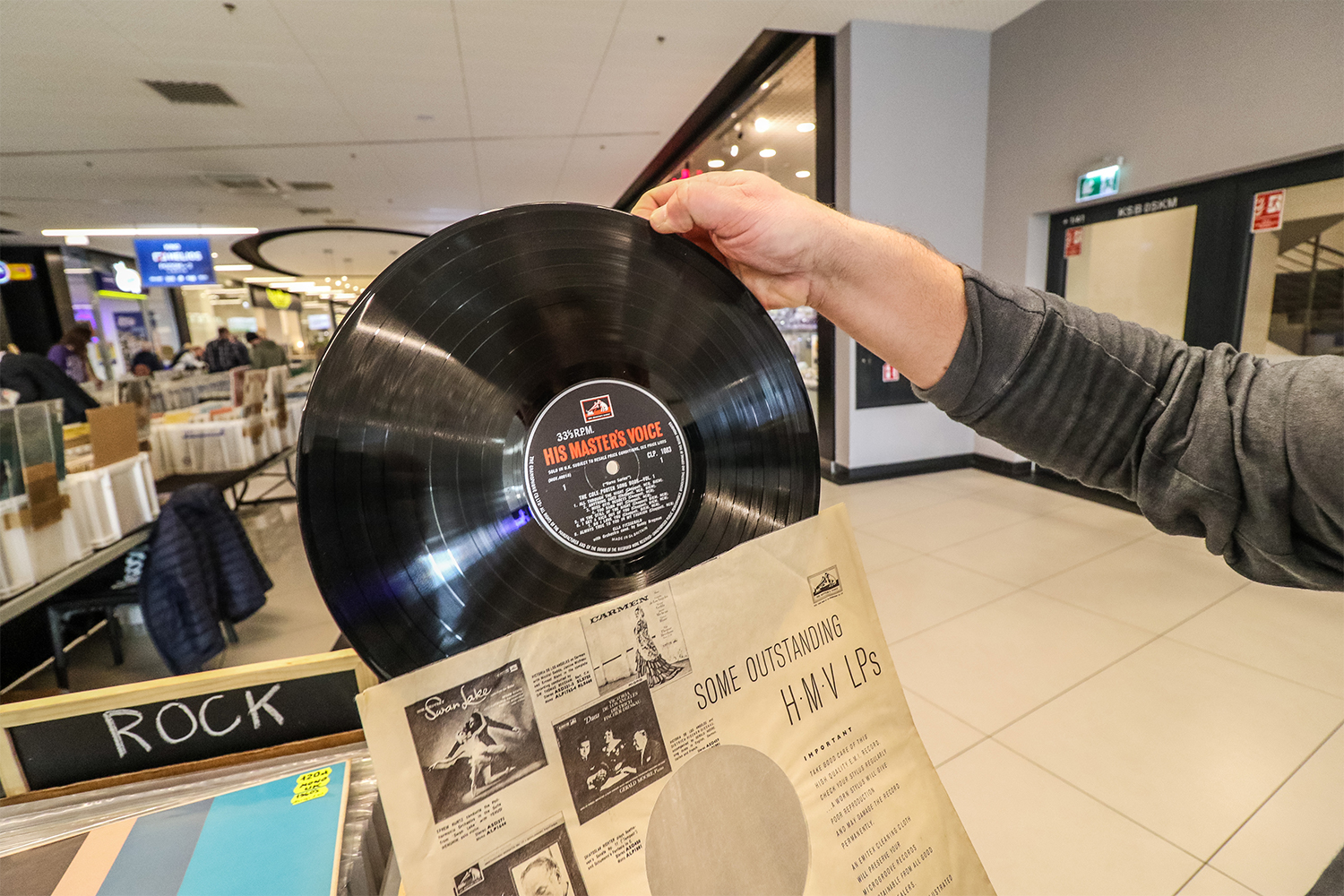As you’ve no doubt already noticed — or perhaps even experienced firsthand — the ongoing COVID-19 pandemic has created massive shipping delays and supply chain issues that have impacted just about every industry in one way or another. But the music industry, already coping with two years of financial devastation due to canceled concerts and consumers’ general inability to leave their homes and, say, go browse inside a record store, has been hit especially hard due to major delays within the vinyl supply chain.
In some ways, the timing couldn’t be worse. Vinyl record sales are the highest they’ve been in 30 years, with wax outselling CDs for the first time since 1991 last year. The format’s popularity has surged over the past decade, with vinyl making up only 1.7% of all physical music sales in 2011 and climbing all the way up to 50.4% in 2021. With demand higher than it has been in decades, independent artists, record labels, pressing plants and record stores are all scrambling to fulfill orders while coping with months-long delays and uncertainty.
“It’s been a problem for every person that I know on every side of this — for bands, for labels, for fans getting stuff,” Pete D’Angelo, label manager at Ernest Jenning Record Co., tells InsideHook. “It’s changed drastically over the last two years. We’ve gone through a few different cycles of having to deal with it. We had records coming out at the beginning of the pandemic, and it was fine. The biggest issue at the beginning was getting them to us. Some of our records are pressed outside of the U.S., and shipping all of a sudden became a nightmare. We couldn’t get our hands on anything. And then there were issues getting the lacquers from some of the mastering places we work with. And everyone slowly started to mention a different issue, and they just kept building and building. And by the middle of last year, it came crashing down on everyone. Everything got bumped.”
The supply chain issues are rough on everyone, but smaller independent labels are being hit especially hard. As Alyssa DeHayes, owner of the Athens, Georgia-based label Arrowhawk Records points out, major labels are better equipped to weather the storm, and indies with smaller staffs and fewer resources don’t necessarily have the bandwidth to deal with the ripple effect of delays.
“Physical formats are our primary source of revenue, considering how small streaming payments are,” she explains. “You can wait a bit to announce an album and set up a pre-order, but you can’t sit on your hands forever, and it’s only natural for people to get antsy and wonder where the item they paid for is. Labels typically put down a hefty deposit for an album to get into production at a plant, so a longer time between paying for inventory, and being able to begin recouping is extra hard when small labels are already just fighting to be sustainable. This also hits small labels after a year of big USPS delays, or packages disappearing all together.”
Naturally, the longer an order is delayed, the more customers begin to lose their patience. D’Angelo says that when vinyl supply chain issues first started cropping up, fans who purchased albums were understanding about the longer waits, but as time went on, their goodwill began to wane.
“People were fantastic about it,” he says. “I mean, when there’s people dying all over the place, telling someone their record’s going to show up at their house a little late is not necessarily the worst thing that’s going on in their life. So people were fairly receptive to those emails, even supportive out of the gates. And then once you get to three months after the supposed release date, they start to get a little more testy.”
Of course, that testiness creates a chain reaction, and labels desperate to get their product out to paying customers begin to pass along their frustration to the pressing plants. Cash Carter, chief sales officer at the Kindercore Vinyl plant in Athens, Georgia, has seen and heard the worst of it. When asked if clients have generally been understanding about delays, he laughs and offers a terse “No.”
“Generally speaking, I would say I get yelled at two or three times a day on a good day, maybe closer to 10 times a day on a bad day,” he says. “I mean, I understand why people are upset. I do. I mean, we give them a date and it gets pushed back two or three times, and I can understand how that’s frustrating, but it’s kind of like, look at the world. It’s in chaos.”
Because things are so chaotic, it’s impossible to pinpoint one single issue that has caused vinyl production to get so backed up. Some fans have attributed the delays to massive pressings from major-label pop stars like Adele, Taylor Swift and Olivia Rodrigo, all of whom sold hundreds of thousands of copies of their latest albums on vinyl last year. Adele in particular has been called out for reportedly pressing over 500,000 copies of her latest, 30 — the argument being that her doing so eats up limited resources and pushes smaller independent artists’ pressings to the back of the line, compounding delays for people who are less financially capable of enduring them than she is. But D’Angelo insists it’s more complicated than that.
“I don’t think it was a specific root cause,” he says. “I think everyone wants to put their finger on this exact thing that happened and say ‘this is why we’re all screwed.’ And it’s easy to point a finger at the biggest-selling artist in the world who doesn’t care what the rest of us may be doing. Or maybe she does care, but it’s just not that simple. I mean, there were plants that we were working with that literally just had to close down for a week or two because half their staff had COVID. And so all of a sudden, that’s two weeks where no one’s getting a record made, where nothing is happening at all, and so those start to add up.”
Ultimately, he says, placing the blame on artists like Adele or Swift is simply deflecting and grasping for an excuse.
“I think it’s an easy target,” he continues. “A lot of people are very happy to criticize people that call records ‘vinyls’ and don’t own record players and have an Instagram of their Taylor Swift record playing on their Crosley. But it’s whatever, let them have it. If that’s the best enemy we can come up with, we’re not trying hard enough. Let people listen to music and buy music. Those artists are not trying to get in the way of independent pressing, but they’re trying to make sure their product is done on time, and they have the money to do it, to basically rent out presses at different pressing plants and make sure their record’s going to be made on time. Most of us are not in a position to do that. But regardless, everyone’s dealing with something or another. And I think it is easy to place the blame on something like that, especially when you literally have customers yelling at you because they’re over it and they just want their record and they don’t care anymore what your excuse is. So sure, blame the biggest pop star in the world — they’re not going to respond to you anyway.”
Scapegoating major-label pop stars isn’t just an oversimplification of the issue. It also overlooks the fact that they’ve managed to get a new generation of young fans interested in buying physical media, something that certainly bodes well for the future. Swift in particular has leaned hard into supporting independent record stores during COVID-19, and earlier this year she was named Record Store Day’s first Global Ambassador.
“Taylor Swift is an artist who has heavily supported independent retail,” says Whitney Couch, merchandise manager at Atlanta’s Criminal Records. “This past year she signed thousands of CDs for indie record stores, and it really helped stores across the country during an otherwise uncertain year. We really appreciate Taylor around here and wish more artists would follow suit. Young musicians who have grown up with streaming may not even think about releasing a physical product when they’re dropping a new album. We are trying to bridge that gap between artists, their management teams and the world of physical media. We really appreciate artists like Taylor who champion for these physical releases. It’s a very symbiotic relationship. When we sell hundreds of albums, they sell hundreds of albums. We win, the artists win, and the record labels win.”
But even if you ignore the way artists like Swift and Adele have helped keep indie record stores afloat during trying times, they’re not the only ones releasing more and more of their work on vinyl. It certainly may not be on the same scale — you’d be hard-pressed (no pun intended) to find anyone else putting out half a million copies of their album on wax — but as DeHayes points out, it’s part of a broader shift to the format.
“Even movies or TV shows are putting their soundtracks out on vinyl at a rate we’ve never seen,” she says. “On the label side, we used to ask ourselves a lot of questions to try to make sure an artist’s fans were also vinyl fans before considering pressing, but artists and labels with the means seem back to doing it automatically, as part of any release, plus increased vinyl singles and EPs or limited-edition variants along the way as stop-gaps. The ‘Adele or Taylor Swift causing the problem’ framing, from my perspective, makes it seem like they had a wild novel idea to offer vinyl, when the entire industry is making more vinyl than ever before. But these massive orders are also able to exert a lot more power over turnaround times, and move through the queue much faster than smaller orders, in addition to just taking up capacity.”
And while it’s true that they’re certainly taking up capacity at larger plants, it’s important to note that they’re not taking up capacity at every plant — and smaller ones like Kindercore Vinyl are more directly impacted by shortages of components like lacquer, nickel, ink, cardboard, paper, PVC and parts that keep their machines running. Carter says the latter is what’s currently causing his plant the most trouble; waiting on parts that are necessary for maintenance has impacted two of their four presses, essentially forcing them to operate at half-capacity.
“We don’t have control over it,” he says. “We are the people they order records from, so I understand why they think this is in our control, and I get asked several times a day, ‘Well, what takes precedent over our records? Why is ours getting pushed back?’ Everyone brings up the Adele issue and I’m like, ‘We’re not pressing Adele.’ We’re not [giving preferential treatment to a] major label or anything like that. We have no control over these things getting moved back. It gets moved back because the supplies we need get delayed. We don’t really have control over your record being late. Which sounds crazy and I understand why people are upset about that, but that’s just the reality of the situation.”
Of course, the uncertainty over when things will eventually begin to return to normal only adds to the frustration. No one seems to have any idea when this storm will pass, and the situation changes every day. But D’Angelo has noticed things slowly beginning to stabilize in a tiny way.
“One of our pressing plants is like, ‘Hey, the turn times are back to where we want them to be right now,’ which is maybe a better representation of where it’s at, as opposed to ‘We can’t even do what we think we should be doing,’” he says. “So I’ll take that. I’ll take someone telling me when my record’s going to be done and and then having my record be done on that day. That’s as good as we can hope for right now.”
Carter, however, is a little more hesitant: “I always have the caveat of having to tell clients now, ‘I’m giving you that date, but we can’t promise any dates. It could be longer.’ The only thing I can promise is that we’ll do our best, but it’s possible there’ll be even delays from that depending on how things shake out and if the supply chain gets worse.”
All anyone can do at this point is hope that the supply chain does not, in fact, get worse. The longer things are delayed indefinitely, the more logistical nightmares small labels, many of whom had modest-sized staffs to begin with and are now bare-bones operations thanks to COVID, are forced to confront. As DeHayes points out, when an album is delayed for a long time, shipping addresses often become outdated.
“When I was working at Asthmatic Kitty Records on a Sufjan Stevens vinyl release that was significantly delayed, we anticipated that in the time between pre-order and ship date, a lot of customers had likely moved, or perhaps changed jobs, where they used to receive mail to their office,” she recalls. “We had to come up with a system of reaching out to customers to inquire about address changes, which often meant manually changing addresses on orders placed through platforms where you can’t just set up an automatic, and the customer can’t edit it themselves. A lot can happen in a customer’s life in six to 10 months, and mail forwarding expires after a certain period and can be unreliable. The fact that your customers could have moved, or even mentally lost interest in the time between pre-order and shipment is an often overlooked issue, and a new logistics challenge for small labels that are usually lean on staff.”
Challenges like that have contributed to some indie labels folding entirely. But despite all the angry phone calls and impossible delays, Carter is confident that at some point, things will turn around and the vinyl supply chain will return to some semblance of normalcy. He knows times are tough now, he says, but he hopes labels will bear with him until the inevitable improvement.
“The major labels can weather the storm because they have all the money in the world, but the medium-sized labels, I’m seeing some of them give up,” he says. “I’m seeing some of them decide that they’re just not going to make records anymore. And that’s a bummer … I would like to tell them it’s going to get better at some point and just hold in there as long as they can. I don’t want to see these medium-sized labels go away. I’m doing everything I can to get in the records in the most expedient way that I can, and I see labels that I like and labels that I respect just deciding they’re not going to do records anymore. I think that once we get past all this, if we get past all this, there’s going to be a shift in the way that people think about vinyl. Hang in there. It will get better. It has to get better.”
This article appeared in an InsideHook newsletter. Sign up for free to get more on travel, wellness, style, drinking, and culture.
























